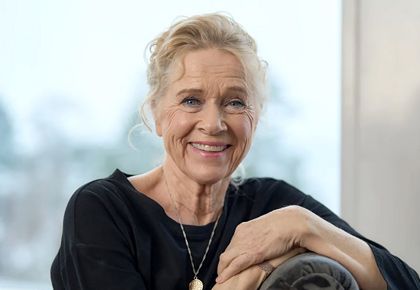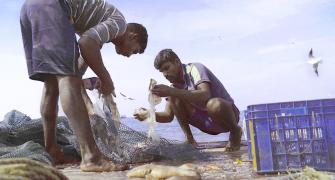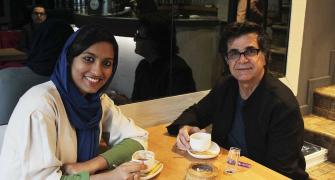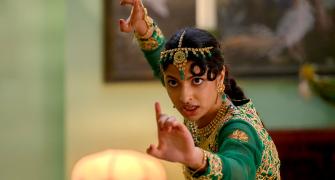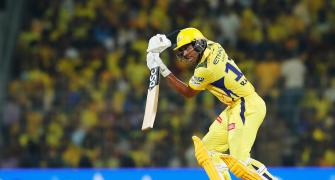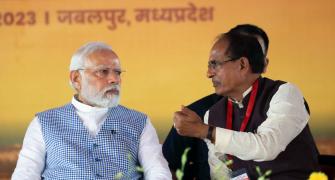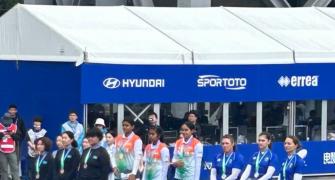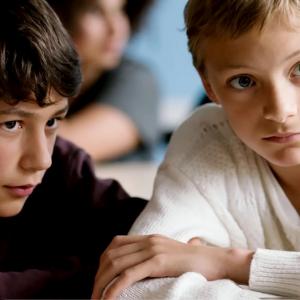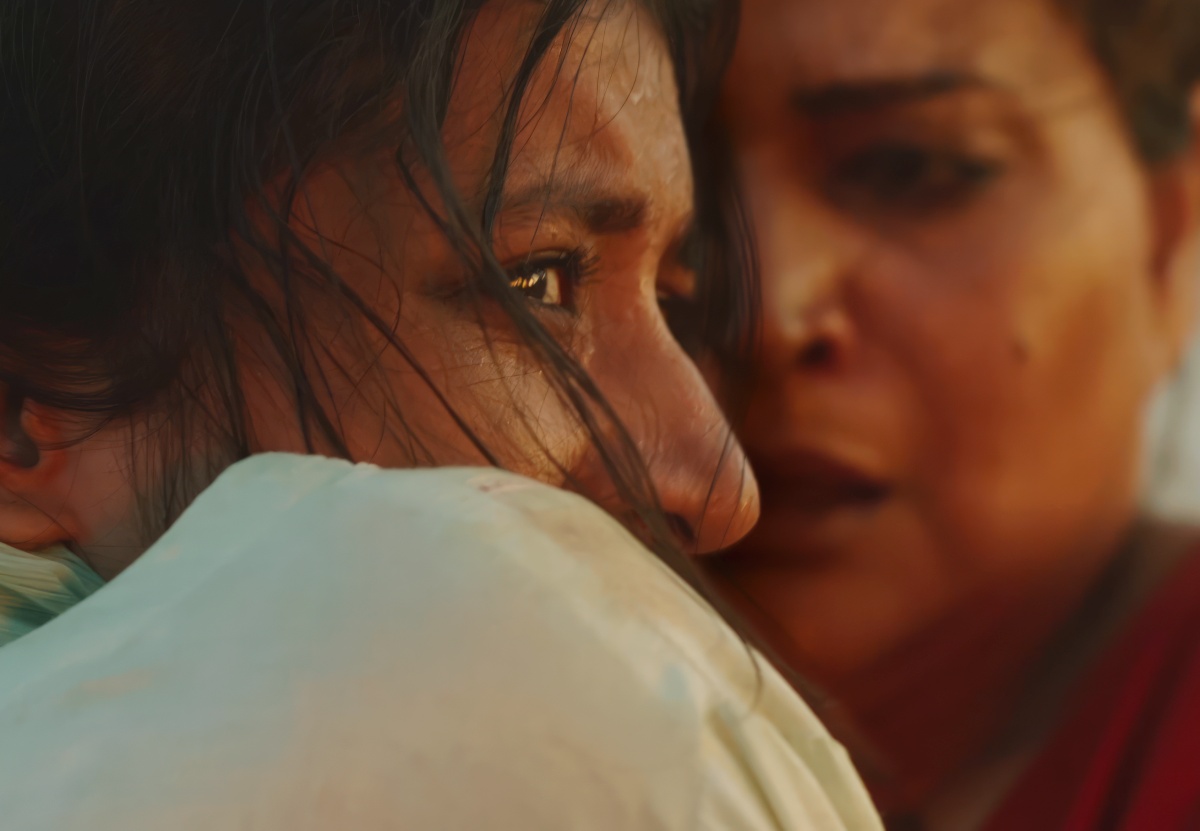'I never got respect as an actress.'
'But when I became a director and worked with actresses like Cate Blanchett and Jessica Chastain, I felt such pride of being an actress.'

London-based Indian film-maker Dheeraj Akolkar premiered his new documentary Liv Ullmann, A Road Less Traveled at the Cannes film festival.
In the film, Akolkar covers the life and career of the celebrated Norwegian actress Ullmann, from her early days in theatre, to working in films with the Swedish master Ingmar Bergman, her venture into Hollywood, two Oscar nominations (The Emigrants and Face to Face), and an honourary Oscar in 2022.
In addition to Ullmann, a range of actors appear in the film, like Cate Blanchett, Jessica Chastain, Jeremy Irons, Sam Waterson and John Lithgow who presented the honourary Oscar trophy to Ullmann.
This is Akolkar's second film on Ullmann.
In 2012, he directed a documentary called Liv & Ingmar where he covered the creative, personal and sometimes difficult relationship between Ullmann and Bergman.
Akolkar started his film career working with art director Nitin Desai on Hum Dil De Chuke Sanam, Lagaan, Devdas and then assisted Sanjay Leela Bhansali. He eventually moved to London.
Aseem Chhabra spoke to Ullmann and Akolkar in Cannes for Rediff.com after the premiere of their film.
"We are moving apart from each other more and more in this world," says Ullmann. "We don't touch. When the camera comes close to you, even if you are showing other things as an actor, I can feel I am close to someone I love the most."
Liv, Dheeraj had already made a film about you and your life with Ingmar Bergman. I had interviewed him at that time. Why did you decide to do a larger extended documentary about your life?
Liv Ullmann: I wasn't planning to and I am somewhat shy. But he came to me and said I would like to make something.
So it was more about my saying 'Oh, it would be nice to work with you again.'
But I didn't really know his idea, except that this was somebody I loved and trusted. Every choice in this movie is his.
Dheeraj, why did you feel you wanted to do a bigger story on Liv? Was it because the first film was just about the relationship between the two people?
Dheeraj Akolkar: I don't choose films. They come to me.
I was traveling from Trondheim to London, and stopped in Oslo at the airport. Suddenly, this thought occurred to me.
I wrote down the idea.
It's perhaps because we have known each other for so long and I have observed her quietly in conversations, and also in silences.
I have read her two autobiographies, but also thought about what she hasn't written.
Films or any thought that is artistic probably comes like a whisper. It was not such a blatant idea. Along the way, it became clearer.
Liv: And things did happen also suddenly. Like when I heard I was getting an honourary Oscar.
That happened during the making of this film?
Dheeraj: Two days before we were sending in the pitch came the news that she was getting an honourary Oscar. I called to congratulate her and the first thing she said, 'This is so good for our film.'
Liv: Coming to Cannes, we didn't know that, right? Because first, we thought were going to show a series with three episodes. Now, it's a feature film.

Liv, how does it feel to revisit your life -- even though you have written two autobiographies -- to look within, the happy and the sad moments?
Liv: I am an actor, a storyteller. I have chosen to be a storyteller.
If somebody I respect, love and admire because he has done a movie about children who were born in the Second World War in Norway, the little babies who had horrible lives because people detested them (Akolkar's 2018 documentary Wars Don't End), somebody who wants to tell a story about life like that, it would be nice for me.
I am a shy person and then maybe I want people to know my story.
At the beginning of the film, you say you felt comfortable with the camera from a very young age. You don't hide your emotions.
Liv: I don't want to hide.
We are moving apart from each other more and more in this world.
We don't touch.
When the camera comes close to you, even if you are showing other things as an actor, I can feel I am close to someone I love the most.
There are so many funny stories in the film. One of my favourites is where you chased Greta Garbo. Have you been chased by fans?
Liv: This morning. I am staying in this small, beautiful, hotel, and was sitting for breakfast. Somebody came and sat far away from me.
The staff asked him, 'Are you staying at the hotel?'
He said, 'No, no, I am just sitting here and I want breakfast.'
It turned out he was a fan.
He didn't come and talk to me, but just when I was going, he asked, 'Can I just take a picture?'
He was French, his T-shirt had the design of the Norwegian flag. That was nice. He just came from the street.

Tell us about the time when you worked in Hollywood films. First, it was Cold Sweat with Charles Bronson, which I haven't seen. But I have seen Lost Horizon and some of the other ones where they made you sing and dance.
Obviously, your work with Ingmar Bergman had reached the US but what did Hollywood think they could get from you as an actress? You spoke English fluently, but you had an accent.
Liv: I don't know. They tried in different ways, a Charles Bronson film, a strange kind of musical, all kinds of things.
Maybe Hollywood wasn't for me and then I didn't want them to change me.
Each time I did something in Hollywood, I went home to Norway or Sweden or England. I was never stationed in Hollywood.
Later, you did you move to New York.
Liv: Much later, when I started to do theatre on Broadway. I moved then because my daughter was 13 and I had to make a choice: Are we staying in Norway or are we moving because she wanted to go to high school in New York?
She attended the Professional Children's School in Manhattan and then went to New York University.
Today, she is an artist. She's a wonderful writer and has written many books.
You started with theatre, then moved into cinema, which just took over your life, and then you also started to direct.
Liv: No, I always did theatre. But then, I did direct movies.
Also, I did theatre with Cate Blanchett.
We had an incredible time working together on A Streetcar Named Desire, first in Australia and then we were invited to Broadway.
The New York Times wrote it was the first time they had seen a Tennessee Williams play done by an Australian and a Norwegian.
Dheeraj: I think The New Yorker review was fantastic. It said something like it is the first time we are hearing these words correctly.

You directed Jessica Chastain in Miss Julie.
Liv: She was incredible.
I never got respect as an actress.
My whole family was shocked. 'How could she be an actress?' They were very religious.
But when I became a director and worked with actresses like Cate and Jessica, I watched them and I felt such pride of being an actress.
I saw how they created their characters. The director cannot work alone.
You could understand them since you had been an actress for a very long time.
Liv: I understood and knew what to say and not to say to them.
I don't say you have to speak like this. We created together.
One of the things you mentioned a few times in the film was that when you started to direct, you would run around getting coffee for everybody.
Liv: I still do that.
Later, when you were working on a script written by Ingmar Bergman, and you wanted to change the ending. You said you did what women sometimes do. You cried.
Liv: That was only with Bergman.
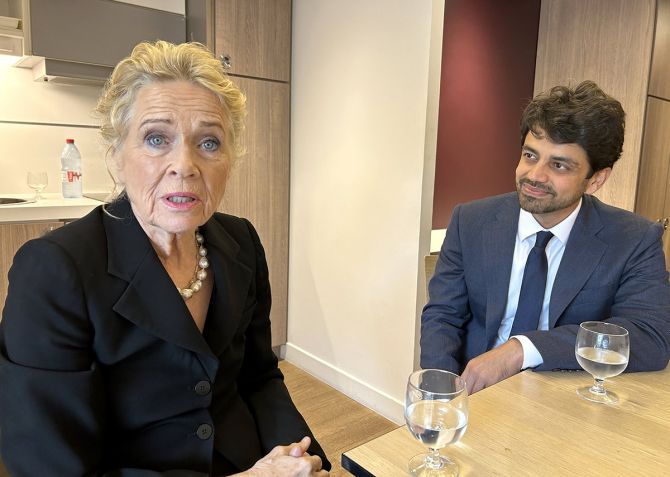
I am curious, since you were so well respected for your work, did you feel women were still treated differently or you had to be somewhat different?
Liv: When I started in theatre and they said, 'This is what you will get paid for this year.' I asked, 'But my colleague here, he started the same way as me?'
They responded, 'Yeah, but he has a family to support.'
They would look at men as supporters, and men are this, men are that.
It was my duty to speak out.
It's very hard to be respected as a human being. That's why we work well together (she holds Dheeraj's hand) because he respects me as a human.
Dheeraj, what else are you working on?
Dheeraj: I am doing a film called The Other Side of Silence. It is the story of sexual violence and children born in conflicts.
I am also working on a fiction drama called My Father Could Also Play the Piano.
It's based on Stefan Nilsson's life, my very dear friend and composer from Sweden, who's got ALS (he passed away a few days after the interview).
It is a story of his volatile childhood with his father.
It's a love story between a father, a son and a piano, and I have set it on the west coast of Ireland, Dublin and London.
